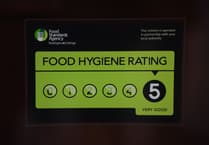The owner of a small rural garage in South East Cornwall is celebrating after the Cornish Times helped him to return to carrying out MOTs and he was given an extension to the time limit required to install expensive new technology required by the Driver and Vehicle Standards Agency (DVSA).
The Cornish Times was first contacted by a person who wished to remain anonymous, asking if we were aware that “VOSA” (the Government agency responsible for monitoring MOTs until this was passed to DVSA around five years ago, though many garages continue to refer to VOSA) was “deliberately closing down garages”.
The man, calling himself “Joe” (not his real name), said: “The reason that garages are shutting is because garages have not updated their equipment and VOSA [ie DVSA] is preventing garages from carrying out MOTs, causing them to lose £700 to £900 per week, making it uneconomical to stay open.”
“Joe” named two garages we could try contacting about the situation. The first did not want to speak to us but when we called the second, St Cleer Garage, owner Alan Johnson was willing to confirm that DVSA had stopped him from carrying out MOTs from March 1 and that his garage was losing £800-£850 a week as a result.
He said he had taken over the small garage last year but at that time he had not been an Authorised Examiner (AE) able to carry out MOTs, but he notified DVSA that he was doing the course to qualify using the email address of the former AE. When Mr Johnson did qualify as the Authorised Examiner Designated Manager (AEDM) at the garage, he notified DVSA of the fact, this time using his own email address.
However, on March 1 this year – out of the blue – DVSA stopped him carrying out MOTs because he did not have the new connected equipment they now require. He contacted DVSA to say that he had not been notified that he needed it, and it transpired they had sent the notification by email on January 12 to the former AE’s address, an email which had then not been forwarded.
Mr Johnson said that he then spent an unbudgeted for £5,676 (a large sum for a small village garage) on the new equipment, and sent DVSA copies of the invoices to prove he had done so, as well as an explanation of the circumstances. However, he said DVSA had shown no understanding and was still insisting that he couldn’t undertake MOTs until the end of March when his new equipment was due to arrive.
He added that this not only meant he was losing revenue but also meant he did not have enough work for his mechanics to do, and he felt he was letting down the village community of St Cleer and surrounding moorland hamlets which had many NHS and other essential workers living in them who needed to get their vehicles MOTd.
Predicament
In addition he said he had heard of other garages across the UK being placed in a similar predicament because suppliers said they had a backlog of orders in obtaining and installing the connected equipment due to the COVID-19 crisis and Brexit.
When the Cornish Times contacted the DVSA, a spokesperson told us they had posted online blogs about the requirement for the new connected equipment needed to undertake MOTs back in September 2019. However, when the COVID-19 crisis emerged, the requirement to install it was put on hold until December 2020, when new posts were put online that garages were being given four months to obtain the new technology by March 1, 2021.
The spokesman added: “DVSA is committed to protecting the public by working with the MOT industry to ensure that tests are done to the best possible standard. Connected MOT equipment saves MOT garages time and improves the accuracy of MOT tests. Clear advice for garages is available on gov.uk.
“When a garage changes ownership, DVSA will also write to them letting them know they have three months to install connected equipment and send reminders before taking action. Many garages have made the move to connected equipment without their service being interrupted.”
The spokesperson went on: “Connected equipment was introduced to help MOT garages save them time and improve the security of MOT tests. MOT test information is directly recorded into the MOT testing system without the tester having to note the information down and transfer it to the system, thereby avoiding possible errors.
“We will be adding more connected equipment over time to the roller brake testers and decelerometers already required. If garages are having problems getting connected equipment, they can contact [email protected] and explain their situation. We will treat each garage on its merits and give advice.
“Garages that don’t meet their deadline for installing connected equipment can still operate carrying out repairs. We work closely with the Garage Equipment Association which helps garages to source equipment.”
Since then there has been a happy outcome for Alan Johnson: he has been given a deadline extension until the end of April. He said: “Just to let you know that I got an email from DVSA late last night and they have given me an extension and are allowing me to carry out MOTS in the short term. I am pleased with the outcome and pleased with DVSA. Thank you (Cornish Times) for your help.”




